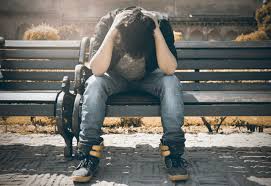Post-traumatic stress disorder, or PTSD, can be a debilitating condition that affects adults of all ages. If you are struggling with PTSD, you are not alone. There are many strategies that can help you overcome this condition and regain your quality of life. In this blog post, we will discuss some of the best treatments for PTSD in adults. We will also provide tips for managing symptoms and rebuilding your life after trauma.
Contents
Understanding PTSD In Adults
 PTSD is generally caused by a traumatic event that is experienced or witnessed. People with PTSD may relive the experience through nightmares and flashbacks, have difficulty sleeping, and feel detached or estranged from others. The condition in adults may seem different in terms of symptoms and severity, but the core features remain the same.
PTSD is generally caused by a traumatic event that is experienced or witnessed. People with PTSD may relive the experience through nightmares and flashbacks, have difficulty sleeping, and feel detached or estranged from others. The condition in adults may seem different in terms of symptoms and severity, but the core features remain the same.
Here are some common signs and symptoms of PTSD in adults may include:
- Intrusive memories: Recurrent, unwanted distressing memories of the traumatic event
- Avoidance: Staying away from places, events, or objects that are reminders of the traumatic experience
- Negative changes in beliefs and feelings: Negative thoughts about oneself or the world, loss of interest in activities previously enjoyed, feeling emotionally numb
- Hyperarousal: Being easily startled, feeling tense or “on edge”, having difficulty sleeping
If you think you might be experiencing symptoms of PTSD, it is important to seek help from a healthcare professional. Professional treatment can make all the difference in managing and recovering from PTSD. Be sure to talk to a therapist or psychiatrist who has experience in treating PTSD.
Remember, you are not alone in this journey. There is support available for those struggling with PTSD, and recovery is possible. Seek help and start your healing today.
Different Treatments For PTSD In Adults
If an adult is diagnosed with PTSD, there are a number of treatments available to help them manage the symptoms and learn how to cope. The main types of treatments for PTSD in adults include:
Cognitive Behavioral Therapy (CBT)
CBT focuses on helping people change the way they think about their traumatic experience by changing their thoughts and behaviors related to it. It helps people identify, challenge, and change their negative thinking patterns. For example, a person may have thoughts that they are responsible for the traumatic event or fear being in situations similar to the trauma.
Through CBT, people can learn effective coping strategies to manage their stress and distress in the present. They can also develop skills to help them handle future stressful experiences without resorting to unhealthy coping mechanisms.
Exposure Therapy
This type of therapy is designed to help people confront their fears in a safe environment. It helps them slowly become exposed to the traumatic situations or memories associated with their traumatic experience over time. The process of exposure can also help people become desensitized to their fear and learn to better cope with it.
For example, a person might be asked to write a narrative of the event or to imagine themselves in the situation without becoming overwhelmed by fear. With repeated exposure, the person will become more and more comfortable with the situation or memory until it no longer causes distress.
Group Therapy
 Group therapy may be helpful for adults who are struggling with PTSD because it allows them to talk with other people who are going through similar experiences. It can be a great way to build support, share stories, and get advice from others in the group. Because it is a shared experience, it can help people to feel less alone. And provide an opportunity for them to learn from each other.
Group therapy may be helpful for adults who are struggling with PTSD because it allows them to talk with other people who are going through similar experiences. It can be a great way to build support, share stories, and get advice from others in the group. Because it is a shared experience, it can help people to feel less alone. And provide an opportunity for them to learn from each other.
Many studies have found group therapy to be effective in reducing symptoms of PTSD and improving the overall quality of life. Be sure to find a group that is led by a qualified mental health professional.
Medication
In some cases, medication may be used to help manage the symptoms of PTSD. Antidepressants, anti-anxiety medications, and other drugs may be prescribed to help reduce anxiety, depression, and sleeplessness. While medication can be very effective, it is important to speak with a doctor or mental health professional about the potential risks and side effects before taking any medications.
However, in various cases, a combination of medications and psychotherapy has been found to be more effective. As this can vary from person to person, it is important to get the right combination of therapies that works best for you.
Eye Movement Desensitization and Reprocessing (EMDR)
This type of therapy uses eye movements and other mental images to help people reprocess their traumatic memories in a more positive way. It can be used alongside other forms of therapy for adults with PTSD. The therapist will guide the person through a series of mental images or stories related to the trauma.
The technique helps people to become desensitized to the fear associated with the event and helps them to move forward. It can be very effective in helping people break free of negative thinking patterns or beliefs that are associated with the traumatic event.
Alternative Therapies
 There are a few alternative therapies that may be helpful for some people with PTSD, such as yoga, meditation, and acupuncture. These types of therapies may help to reduce symptoms such as stress, anxiety, and depression. They can also be a great way to develop self-awareness and learn healthy coping strategies.
There are a few alternative therapies that may be helpful for some people with PTSD, such as yoga, meditation, and acupuncture. These types of therapies may help to reduce symptoms such as stress, anxiety, and depression. They can also be a great way to develop self-awareness and learn healthy coping strategies.
It is important to talk with your therapist or doctor before trying any alternative therapies. As they may not be appropriate for everyone. This is also important to remember that these therapies are not a substitute for professional medical care or treatment.
No matter which treatment is chosen, it is important to find one that works best for each individual case. It may take some time to find the right combination of treatments and therapies that work for a person struggling with PTSD. Working closely with a mental health professional can help people make sure that they are on the right track.
What Is The Fastest Way To Calm PTSD In Adults?
The condition known as post-traumatic stress disorder (PTSD) can be quite daunting to manage. But there are some natural strategies that may help adults with PTSD as fast as possible. These include:
- Deep Breathing
Taking a few minutes to focus on the breath and breathe deeply can help to relax the body, calm racing thoughts, and reduce overall stress levels. You can start by taking a few slow deep breaths, focusing on breathing in and out.
- Mindfulness Meditation
Practicing mindfulness meditation can help to increase awareness of thoughts and feelings without judgment or attachment. This compassionate approach may help reduce symptoms of PTSD as it cultivates acceptance and understanding of emotions while calming the mind and body.
- Exercise
Regular physical activity can reduce symptoms of PTSD as it increases endorphins in the body. Low-intensity exercises such as walking or yoga can help to reduce stress and improve mood. When you exercise, your body releases “feel-good” hormones that can help to relax the mind and reduce anxiety.
- Journaling
Writing out thoughts and emotions is a great way for adults with PTSD to gain insight into their experiences, process their feelings, and reduce stress. Writing in a journal can be especially helpful for understanding and releasing difficult emotions.
- Healthy Lifestyle
Finally, when an adult is dealing with PTSD, it can be helpful to focus on their overall health and well-being. Eating a healthy diet, getting regular exercise, reducing caffeine and alcohol intake, and limiting screen time can all help to reduce symptoms of PTSD.
By using these natural strategies, adults with PTSD may find that they can manage their condition faster than with traditional treatments. However, it is still important to talk to a therapist or other mental health professional for additional support and guidance. With the right methods, adults can learn to manage their PTSD symptoms in a healthy way.
Conclusion
To conclude, treatments for PTSD in adults are varied and depend on the individual’s needs. Treatments can include medication, therapy, or a combination of the two. It is important to find the right treatment for you in order to get the best results. While PTSD may be a difficult condition to manage, with proper care and support, individuals can take control of their lives and experience meaningful recovery. With the right approach, individuals may be able to find comfort and hope in their daily life.
For more information, please contact MantraCare. PTSD or Post-Traumatic Stress Disorder is a mental health condition that affects people who have experienced or witnessed a traumatic event. If you have any queries regarding Online PTSD Counseling experienced therapists at MantraCare can help: Book a trial PTSD therapy session


